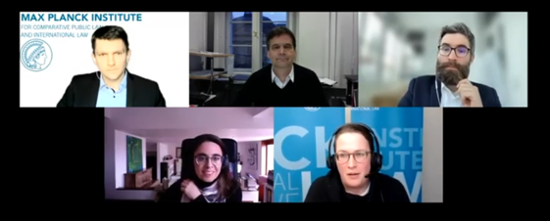You are here: Institute The Institute Berlin Office Events Heidelberger Salon HD Salon 10.02.22

On 20 January 2022, the European Parliament adopted by a large majority its position on the draft Digital Services Act which was proposed by the European Commission in December 2020. The negotiations with the European Commission and the Council started on 31 January 2022.
Appropriately, on Thursday, 10 February 2022, MPIL’s Berlin office, in cooperation with Global Freedom of Expression, Columbia University, hosted a Heidelberger Salon digital on the timely question of Who is the Guardian of Free Speech? Meta’s Oversight Board and (other) Courts and Dispute Resolution Mechanisms. The panel of experts was composed of Oversight Board’s Co-Chair and former Inter-American Rapporteur for Freedom of Expression Professor Catalina Botero Marino, Professor Matthias Kettemann (University of Innsbruck/Hans Bredow Institute, Hamburg), Professor Martin Eifert (Humboldt University Berlin) and Erik Tuchtfeld (MPIL).
The debate, moderated by Alexandra Kemmerer, opened with an initial statement by Catalina Botero Marino who provided an instructive insight into her work with the Oversight Board (OSB). In her comment, she placed particular emphasis, on the one hand, on the OSB’s function as a complement and not substitute for other efforts, in particular legislation like the proposed Digital Services Act. On the other hand, Botero Marino stressed insistently that the Oversight Board differs from regional and national initiatives in a crucial respect: the Oversight Board focuses solely on international human rights standards, considering the impact policies and decisions have on communities globally. Rather than taking into account national or regional particularities, it aims at building a coherent doctrine consistent with universal human rights law.
Matthias Kettemann subsequently contextualized the OSB’s work and outlined the overall process of privatization of online spaces. He then pointed out the various questions following from this development: To what extent do we want states, through their courts, to define global communication rules, particularly when it comes to content that is not illegal but potentially problematic? How do we ensure that social media oversight boards succeed in achieving an equilibrium between public values and legitimate private interests of platform providers? Should we have a collection of different oversight boards or should there be one general oversight board, for instance a European Union platform counsel?
In his statement, Martin Eifert set out to answer some of these questions. He argued for leaving the limits of permissible speech to state legislation and for binding platform providers as regards further restrictions in their community standards – with due regard to the horizontal effect of fundamental rights. In doing so, he cautioned to take the fragmented structure of communication markets and the cultural embeddedness of freedom of expression into account, thereby questioning the viability of a universal approach as proposed before. As regards the question of competent institutions, Eifert recognized a need for private dispute resolution mechanisms. He demanded, however, that a final full review by a state court must remain possible in any case.
Finally, Erik Tuchtfeld added a comparative perspective to the debate. He contrasted the approach of US courts – not regarding themselves as guardians of free speech against private actors – with the European, particularly the Italian and German approaches according to which, at a minimum, a procedural standard of non-arbitrariness applies. Tuchtfeld then examined the proposed Digital Services Act and found that its answer to the overburdened state court system is to set up a private imitation of it. He deemed this development a step into the direction of constitutionalizing the private sphere while at the same time proving an ongoing privatization of the public sphere of the internet.
In the following Q&A, around 80 registered participants had the chance to contribute to the debate by sharing questions and thoughts. The issues of hate speech and fake news were raised. Participants also posed the question of civic responsibilities of platform providers which led to a discussion of the collective dimension of freedom of expression, ensuring participation in the online discourse also by members of minorities and marginalized groups.
The Heidelberger Salon digital was streamed with the option of a parallel Spanish translation, kindly organized by Catalina Botero Marino’s team, providing Spanish speakers with the opportunity to follow the discussion live. It was livestreamed via Verfassungsblog and Völkerrechtsblog.
Report: Lisa Pitz

By loading the video, you accept YouTube's privacy policy.